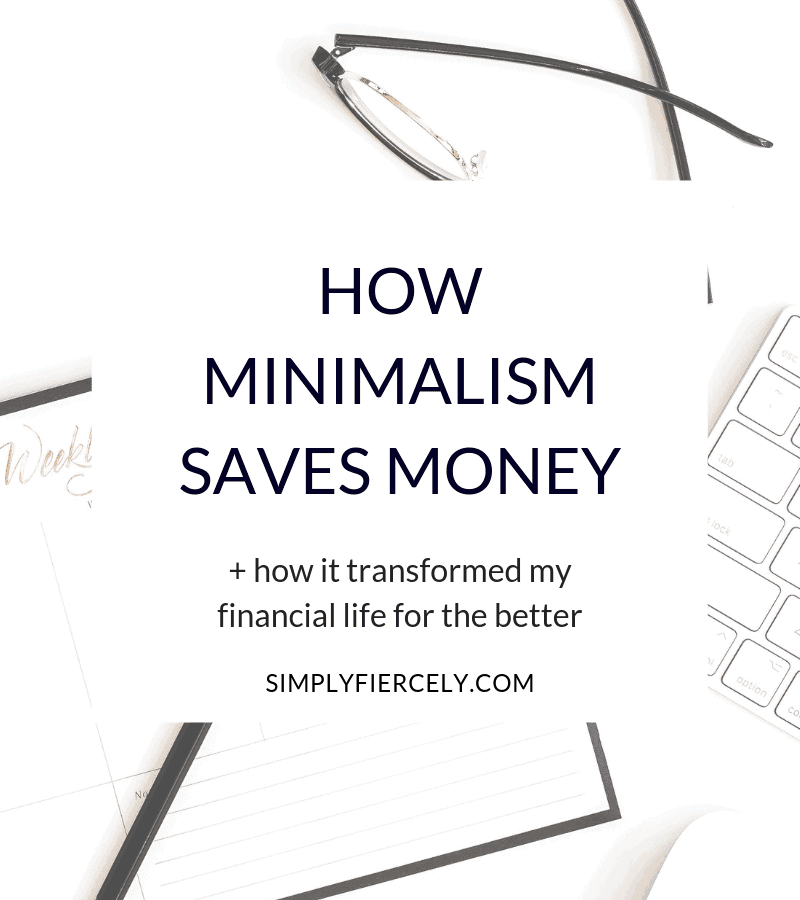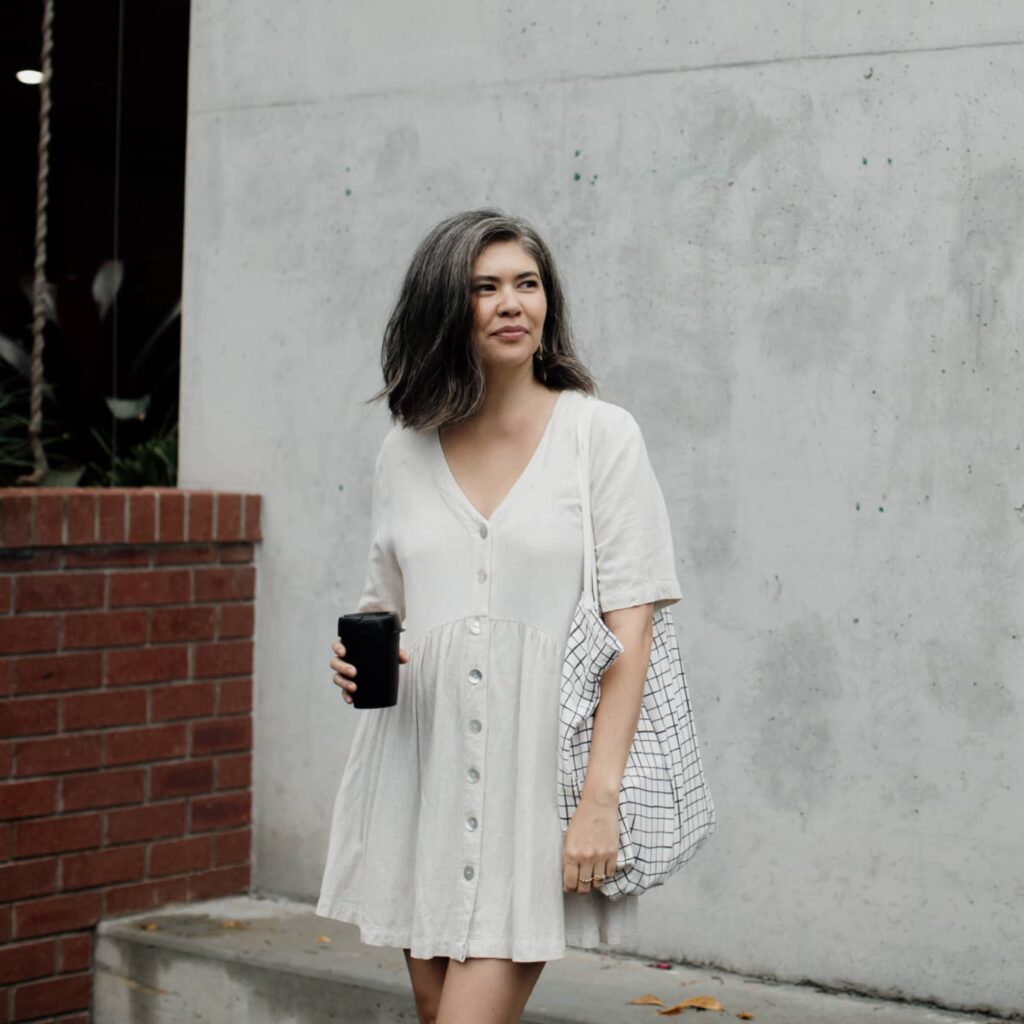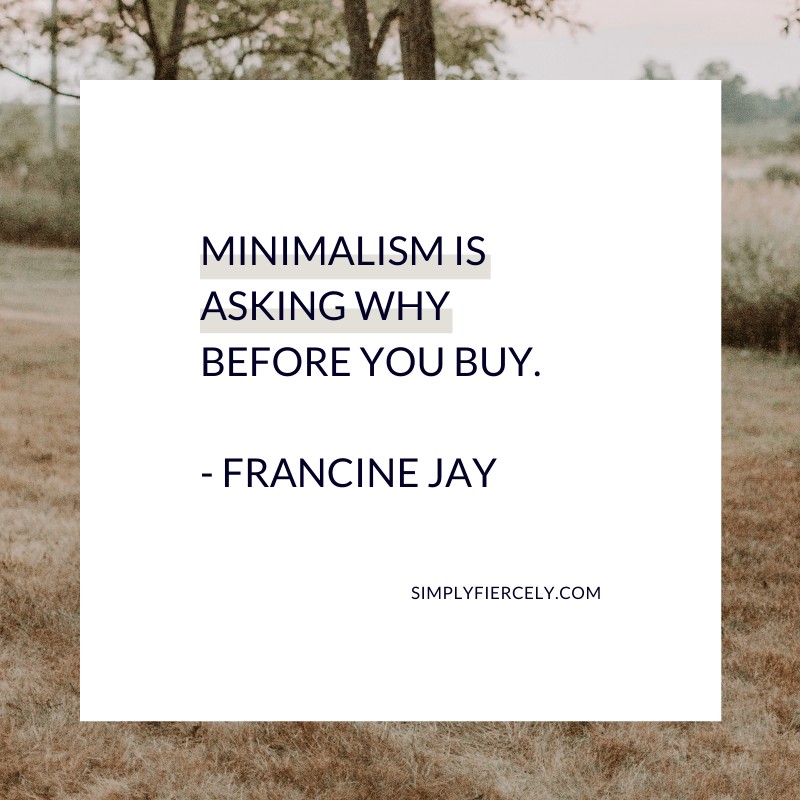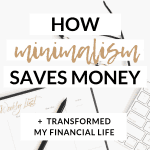Are you looking for minimalist money saving tips? Keep reading to learn more about how to live minimalist and save money in the process!
A decade ago, I was a shopaholic living paycheque to paycheque and relying heavily on credit cards to support my inflated lifestyle. I had no savings and I felt like I was spiralling out of control.
If you had told me back then that within a few years, I’d be debt-free AND I’d save enough money to go on a seven-month honeymoon, I would have laughed in your face—but that’s exactly what happened, and I have my minimalist lifestyle to thank!
If you’ve ever wondered how minimalism saves money then keep reading to learn more. I’m sharing the details of how minimalism improved my financial life and also tips to help you live minimally and save money too.

Does Minimalism Save Money?
Before we get started, I think it’s important to mention that minimalism doesn’t automatically save you money—especially if your definition of minimalism is centred around owning as few things as possible.
After all, you could declutter your entire home overnight but this doesn’t necessarily mean that you’ll change your spending habits.
This is why I’m not a huge fan of the “one in, one out” decluttering rule. In a sense, it grants you permission to keep consuming and spending as long as you keep decluttering to balance the equation. Also, I acknowledge that there are times when buying more makes better sense from a financial perspective (i.e. buying in bulk).
Having said that, if you believe that minimalism is about intentionality (it’s less about how many things you own and more about how the things you own add value to your life) then YES — minimalism absolutely saves you money.
This is because it teaches you to align your choices with your personal values and vision, and these choices include your spending habits. Let’s take a closer look at what this means in practical terms.
How Does Minimalism Save Money?
Here are four powerful ways minimalism saves money:
- You become intentional with your purchases
- Decreased housing costs due to downsizing
- You have more time and energy
- Minimalism encourages a long-term focus
Let’s take a closer look at each of these.
You become intentional with your purchases
Here’s a genuine question—how do you currently decide what you’re going to buy?
For most of my life, I didn’t put much thought into my purchases. Instead, I asked “Did I want it?” and “Could I afford it?” (and to be honest, I wasn’t even very strict with the answer to the second question … if my credit card wasn’t maxed out, then I could “afford” it).
I knew that I wasn’t being responsible but at the same time, I felt that as long as I didn’t go into too much debt, then I didn’t have a shopping problem.
Then I became a minimalist and my mindset completely changed.
As I decluttered my home, I began to regret spending money on so much useless stuff and I started looking at my things differently. My closet full of unworn dresses was so much more than just a clutter problem—it was evidence of the hundreds of hours of my life that I had wasted.
Yes, I had literally traded away hours of my life working in a job that made me miserable to buy stuff that I didn’t even really want. It was an eye-opener, and I started to think about my purchases differently.
I began asking “What value does this add to my life?” and “What am I giving up in exchange for this?” before spending money, and with this mindset, I found that I genuinely didn’t want to buy as much anymore.
I learned to stop mindless shopping because very few things seemed worth the sacrifice of my precious time, money and energy.
Related Post: 5 Essential Mindsets for Simple Living

Decreased housing costs due to downsizing
After decluttering my life, I was able to downsize from a two-bedroom townhouse to a small studio apartment, which cut my living expenses by more than 75%.
Yes, you read that right—by more than 75%! I paid a LOT less in rent and my utilities were significantly less too. It’s amazing how it all added up. This is just one of the powerful benefits of decluttering.
I know this isn’t possible for everyone and to be honest, it wasn’t a long-term solution for me. (I now live in a 660 square foot apartment, which is much smaller than my townhome but nearly three times the size of my studio apartment).
Still, I highly recommend that anyone who is trying to save money consider downsizing—even if it’s just a temporary solution. Your rent or mortgage is probably one of your biggest expenses so reducing it for even a year or two can have a major impact on your finances.
Even if you can’t downsize your home, you’ll probably still find that owning less unnecessary stuff reduces your expenses. When you declutter and live minimally, you pay less on utilities, maintenance or even storage.
Related Post: Where to Start Decluttering Your Home (5 Quick + Easy Ideas)
You have more time and energy
Have you ever noticed that whenever you’re tired, busy or overwhelmed, it’s easy to spend money on expensive convenience purchases?
You buy takeaway meals because you’re too tired to cook dinner, milk at the overpriced corner shop because you don’t have time to go to the supermarket, or you treat yourself to an expensive coffee because you need a pick-me-up?
I’m guilty of all of these because when I’m exhausted, I go into self-preservation mode. I do whatever will make life easier and I’m not thinking about my future or saving money. I just want to get through to the end of the day!
Fortunately, since discovering minimalism, things have changed. Of course, I have bad days like anyone, but overall one of the benefits of minimalism is that I have more time and energy than ever.
This means I’m no longer looking for quick and easy purchases to help me survive. Instead, I feel empowered to make mindful choices that align with my values and save me money.
Minimalism encourages a long-term focus
When you declutter your home and life, you start to be intentional about what you’re going to keep and by extension, what kind of life you want to create.
This encourages a long-term focus that (at least for me) didn’t exist before minimalism. I realised that I wasn’t powerless and I didn’t have to float along, doing what everyone else was doing if I didn’t want to.
I didn’t have to be a slave to money. Instead, I could use it to serve me, which meant I started to:
- Prioritise saving and paying myself first
- Feel good about spending less
- Think about my personal vision and how my money could help me achieve it
I learned how to get out of debt and save money by making small intentional choices every day to have more of what really matters most to me.
I decided that I wanted time with family, opportunities to travel, and freedom to change careers more than I wanted a closet full of discount t-shirts and whatever else I found on the clearance rack at Target.

7 Minimalist Money Saving Tips
Here are seven minimalist living tips that will save you money:
- Plan to shop and do research ahead of time. The more organised you are, the less likely you are to make impulse purchases.
- Creating the habit of pausing before you buy. Ask yourself “how will this purchase add value to my life?” and if you don’t have a good answer, don’t hand over your money.
- Embrace simple eating—learn how I save money, reduce stress and spend less time in the kitchen.
- If possible, choose high-quality items that will last over cheap “bargains” that will fall apart after a few uses. (If you’re on a tight budget, second-hand shopping is a great way to buy quality items at low prices.)
- Know your spending triggers—what makes you want to shop? Is it your way of dealing with stress? Do you shop because you compare yourself with others? Once you identify your spending triggers, you can make a plan to reduce them.
- Work on your self-worth. Learn to unravel your value as a person from the things you own. The more confident you feel in yourself, the less you’ll need “stuff” to make you feel better.

The Limitations of Financial Minimalism
So far, I’ve shared some tips for being a minimalist and saving money (and I have a few more to share in a minute!). But first—given the state of the world as I write this—I want to point out some limitations of financial minimalism.
Obviously, a lot of people who are struggling financially are already living quite “minimalist” lifestyles. They don’t have money to spend in the first place so shopping less isn’t going to help, and downsizing isn’t possible if you can’t save up for a new deposit. These are just a few examples of why it’s hard to break the poverty cycle.
In fact, for some people, decluttering and owning less is not a good money decision. Ultimately, money is personal, so the point of this article is not to assume I know what’s best for everyone. Instead, I offer my experience with minimalism and money, with the hope it can help others in a similar position.
How to Be a Minimalist and Save Money
Alright, so if you think minimalism is for you and you think it can help you save money, here are some practical tips. First and foremost, I invite you to download a free copy of Mindful Decluttering.
Mindful Decluttering is a step-by-step decluttering guide and workbook where I share the exact process that helped me go from shopaholic to minimalist.
It’s free for subscribers—simply enter your details below for instant access (and as an added bonus, you’ll get my weekly newsletter where I share personal stories and lessons about simple living).
In addition, I recommend you check out this blog post about getting started with minimalism or try one of these fun ways to “kick-start” your simple living journey. These are both great beginner’s resources.
Alternatively, if you’re already familiar with minimalism and you want to take things to next level, you can read more about living a minimalist life or my minimalist approach to life.
Read More About Minimalism and Money
You might also enjoy one of the blog posts about minimalism and money.
- How Minimalism Helped Me Become Debt Free
- 7 Things You’ll Never Regret Spending Money On
- How Mindful Spending Helps You Live a Life You Love
- Shopping Tips From a Minimalist: How to Buy Less But Better
Has minimalism helped you save money? And if so, how? Let me know in the comments!


Good lesson to learn from
I have been minimalist all my 45 years of working life. And now I retire rich millionaire
I always thought being able to purchase things was a sign of progress and success. Growing up you worked hard to earn enough money to be able to but what you wanted. So if you made more money, you could buy more stuff.(in theory) I see here in lies the problem
I’ve been in this page a while….